Here we bring you the personal account of the exciting life’s journey of one of the top contemporary writers from the area of the former Yugoslavia. What was he made beholden to by his ancestors, or by his parents and extended family? How did the war split his life into two completely different parts? Why do he and his wife Ana Bogišić live in a village near Zagreb, and why does he visit Belgrade more often than to his native Sarajevo? How does he view Ivo Andrić and what are the common characteristics of Andrić’s world and his?
He attended the same Sarajevo gymasium high school as two of the most famous natives of Bosnia: revolutionary member of the Young Bosnia movement Gavrilo Princip and Nobel-prize winning author Ivo Andrić. He went on to graduate in philosophy and sociology, prior to which he’d already started writing. Bornin 1966, Miljenko Jergović was a Yugoslav before the wars of the ’90s, while today he is known as a Bosnia-Herzegovinian and Croatian writer. An even more amusing illustration of the times that we lived through is the fact that his wife enrolled to study Yugoslav literature in Zagreb and Yugoslavia disintegrated while she was still studying, which meant that she ended up graduating in Croatian literature. An editor and proofreader by profession, Ana is the only proofreader and editor of Miljenko’s books.
“That’s a very important and fundamentally delicate matter. It was extremely difficult before her, just as it would be very difficult with someone else today, because I would have to explain too many things to those people. I reached my wits’ end explaining to people that the language in which I write does not appear in Croatian dictionaries. That’s my language; I have the right to my own language. Ana is my protector against the terror of standardised dictionaries and standardised grammar.” He was just over 20 when he wrote the poetry collection The Warsaw Observatory [Opservatorija Varšava], for which he received the Ivan Goran Kovačić Award, Yugoslavia’s top award for poetry. He has since written around 50 books in various genres, which have been translated into 20-odd languages. These works are partly fiction and partly autobiographical, and for 1994’s Sarajevo Marlboro collection of stories he received the Erich Maria Remarque Peace Prize. Representing Jergović’s personal testimony to life in wartorn Bosnia-Herzegovina, it is still discussed to this day. Thanks to the persuasive argument of his translator to Polish, but also his own desire to see how Sarajevo Marlboro, which he wrote when he was 27, would look when written by a man of 54, he penned the book Three for Kartal [Trojica za Kartal], with the subtitle Sarajevo Marlboro Remastered. Inspired by the stories from the book that made him famous, Three for Kartal was published by Booka in Belgrade last year.
I reached my wits’ end explaining to people that the language in which I write does not appear in Croatian dictionaries. That’s my language
He lived in his native Sarajevo until 1993, when he moved to Zagreb. Nowadays he spends his winters in the Croatian capital, spending the rest of the year living in the Turopolje region, around 20 kilometres from Zagreb. Together with his wife Ana, he visits Belgrade relatively regularly to relax and see friends. This time around, when we used the opportunity to record this interview for CorD Magazine, he had come to the Serbian capital to attend the premiere of TheIdiot, under the production of director Ivica Buljan, at the Belgrade Drama Theatre.
There are numerous books in which Jergović discusses his family. His long-divorced parents, but also his close relatives on both his father’s and mother’s sides. And when asked how he would describe the upbringing he received at home, or what is referred to as home education, this writer answers:
“I’m actually the child of my Nono and Nona, or my maternal grandparents. So, I have no experience of home education from my parents. When I recall them today, it is both completely unimaginable and terrifying that they could have brought me up, because who knows what would have come of that and how that would have looked. I am really a child of my previous ancestors, or my grandparents. In that sense, the world of my upbringing and maturing process also somewhat reflects a kind of previous civic world. I suppose I was brought up in the way kids had been raised in the 1930s. In a way I thus belong to the generation of Bora Ćosić. [writer Bora Ćosić turns 91 on 5th April this year]. And I don’t say this by accident. That’s because when I read his book My Family’s Role in the World Revolution, I somehow actually see the world of my own home in the most intimate possible sense. And that isn’t really normal, given that he was raised 35 years before me.”
Miljenko’s grandfather Nono was actually called Franjo Rejc. He lived as a Bosnian, but had Slovenian origins and self-identified as an ardent Slovene. Grandma Nona, Olga Rejc, was the daughter of an ethnic German from the Banat region. And everything else in her family was equally complicated and mixed, such that it could be said that she was a typical child of the Austro-Hungarian monarchy.
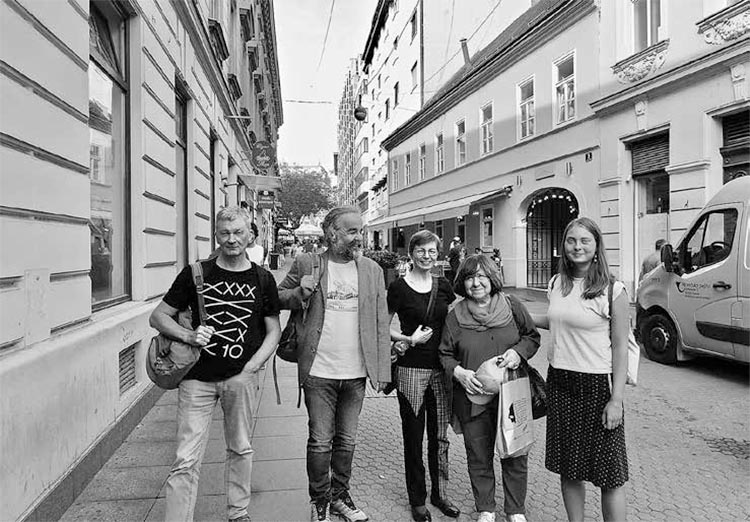
“From the upbringing I received from them, I was left with a kind of detachment, withdrawn nature and non-aggressiveness. And some learned sense that this is not my city and this is not my world, and these aren’t my people. That’s something I’ve carried with me from an early age, and which has often caused me all sorts of social problems, but, unfortunately, that’s ultimately exactly how it turned out. In the end, both my life and my world turned out just as Nono and Nona told me they would.”
Responding to the observation that his literary work, particularly the vivisection of his family relationships, is capable of irritating the public, he offers a simple explanation:
“Literature is actually writing about something that is either impossible to write about or shouldn’t be written about. That’s because it’s actually meaningless to write about something that’s easy to write about, can be written about and everyone recommends as a topic to write about. One writes about what should not be written about or discussed.”
It was almost thirteen years ago that he published the novel The Father, which is actually a story about his own father that received very fierce public reactions.
It’s actually meaningless to write about something that’s easy to write about, can be written about and everyone recommends as a topic to write about. One writes about what should not be written about or discussed
“That had a slightly scandalous effect, but to me there was nothing scandalous about it. I didn’t intend to cause any scandals; I had no intention of provoking anyone. That was a story about my father, about my life, about the times I lived through. In an attempt to hide it from people who might take it the wrong way, I published the book in Belgrade [published by Rende]. That was a targeted move, as I counted on it going unnoticed among some malicious and ill-intentioned people in Zagreb. However, that just made it even worse.”
Miljenko’s father, Dobro, was a respected, highly-rated and beloved doctor in Sarajevo, and in his son’s eyes, he was “a great doctor, and that fact made up for everything that he was incapable of being in life. For him, medicine and his mission compensated fully for everything else. And that’s generally not an uncommon human trait.”
His mother, Javorka, was the most beloved character at the Academy of Performing Arts in Sarajevo, where she worked as head of the accounting department.
“Unlike my father, she was extremely sociable, and all beyond the confines of the home. It was decidedly glooming in the house, which was a combination of being unfulfilled in life and emotionally, due to the huge burden of her poor relationship with her parents. She lived as though life had betrayed all her expectations and she was annoyed with her own life and all those who she felt stood in her way in that life. She was essentially an extremely problematic mother. There were moments and periods in her life when she didn’t shy away from showing me that I’d ruined her life’s journey in a certain way.”
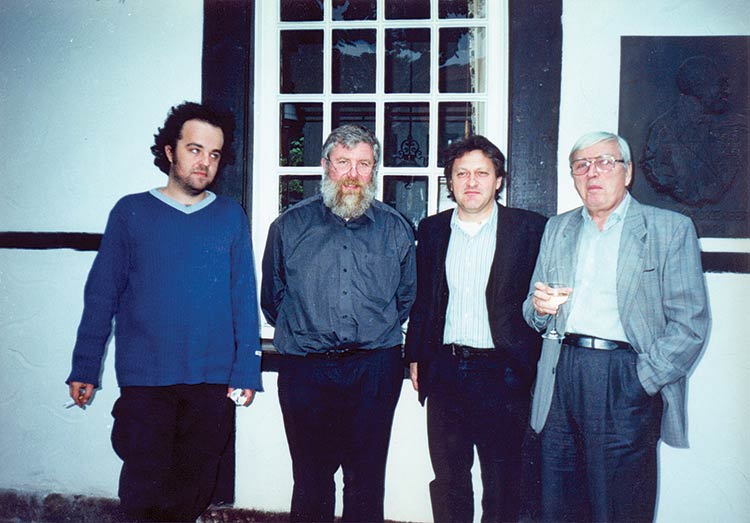
As an educated and intelligent woman, Miljenko’s mother understood the way literature functions perfectly. She also understood her own role as a character in literature: “It is interesting how much could be written about her without her taking it personally.”
Jergović’s many stories, novels, essays and columns have been subjected to numerous comments, from shows of admiration to the casting of aspersions. His spiritual path, often teetering on the brink of the abyss, has prompted emotionally intoned judgements among readers and critics alike, but he didn’t reflect on them too much. Is that an integral part of his personality, or did he try a little harder to publicly communicate things that most would prefer not to mention?
“I think that’s a combination; that it relates very strongly to the certain kind of ‘outsiderness’ from which I emerged. Outsider in the broadest possible sense. For instance, you live in a multi-ethnic community like Sarajevo, while at the same time your origins are extremely complicated compared to that multi-ethnic community, and even extremely problematic in a political identity, ideological sense. And that was particularly so in Sarajevo, which was a pretty dark corner of Yugoslavia at that time, because various services were very fond of using such things to blackmail people. And I was, in a way, a child of enemies of the people. My parents weren’t enemies of the people, but rather loyal Party members, but my paternal grandmother had been a member of the fascist Ustasha Youth, and my mother’s much older brother had served as a German soldier in World War II. That knowledge had been present in the house and discourse with the external world was adjusted according to it, firstly towards the first neighbourhood, and then towards everything. There was fear over what someone would say, who would report whom, what that information could mean somewhere.”
I was, in a way, a child of enemies of the people. My parents weren’t enemies of the people, but rather loyal Party members, but my paternal grandmother had been a member of the fascist Ustasha Youth, and my mother’s much older brother had served as a German soldier in World War II
Miljenko developed an aware of this early on. He belonged to the ‘lucky generation’ of children who were left home alone by their parents and grandparents.
“Nona would go to the market, I would somehow get out of having to go with her, and as soon as she’s was out of the door, I would start rummaging through their drawers in search of documents, in search of secrets. I started doing that when I was eight or nine years old. Before the age of ten, I’d discovered the dark secret of my elder uncle. It is today impossible to explain what a shocking thing that was for me. It’s like finding out that your uncle was a salamander, that he didn’t belong to the human race. I think that was the moment that marked the start of my great interest in such things.
“As for my paternal grandmother, she has been the ultimate villain since I was born. A very dark woman who I quickly learnt was actually an Ustasha woman. That was somehow perfectly logical to me, given all the other negatives about her. That remained a reflex of mine as an adult. For example, today, as an older man, I often wonder whether my deep-rooted intolerance of the Ustasha and domestic traitors contains something completely personal that’s much more intimate than nationalism and historical facts.”
Survivors always have a right. And that marks the emergence of deep injustice, which is blind to its victims. Since the war, Sarajevo has been a city where the survivors often suffered more than those who took the bullets. While everything resembled an idyllic place unstained by blood, Miljenko grew up in Mejtaška Mahala, or the Mejtaš Quarter, with this toponym also finding its place in his literature.
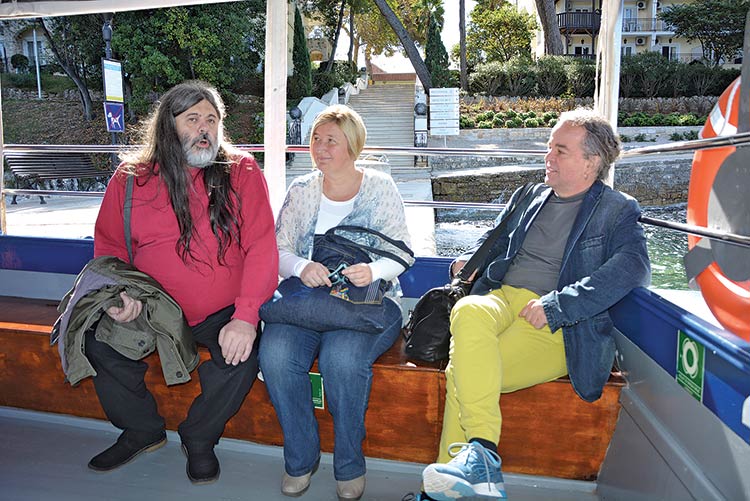
“Mejtaš is a small crossroads in Sarajevo that’s slightly elevated above the city. A steep street leads up t it, and extending from there is a series of steep and very steep streets. These are some of the sunny slopes of the city. There was a Muslim cemetery and mosque there until about eighty years ago, when they disappeared. Those graveside monuments, or tombstones, were carried off somewhere, the plateau was asphalted and covered by streets. The mosque burned down during the 1920s, with a grocery shop built on the site later, after World War II.
“The word mejtaš itself refers to the stone on which the deceased is placed before the funeral, or Islamic burial. It’s a kind of stone catafalque. Mejt means corpse and taš means stone. The neighbourhood itself consists of a square and a dozen surrounding streets and alleys. This was the place where I grew up in Sarajevo. At the same time, I also had the privilege, or misfortune, of having two parallel upbringings. I grew up as a little Bosnian and Sarajevo native in Mejtaš, and as a Dalmatian at Nono and Nona’s place in Drvenik, where I’d spent eight months of each year until starting school. So, as a kid I changed identities on a seasonal basis, which seems bizarre, but it was a huge difference. I was both identities, but actually neither.”
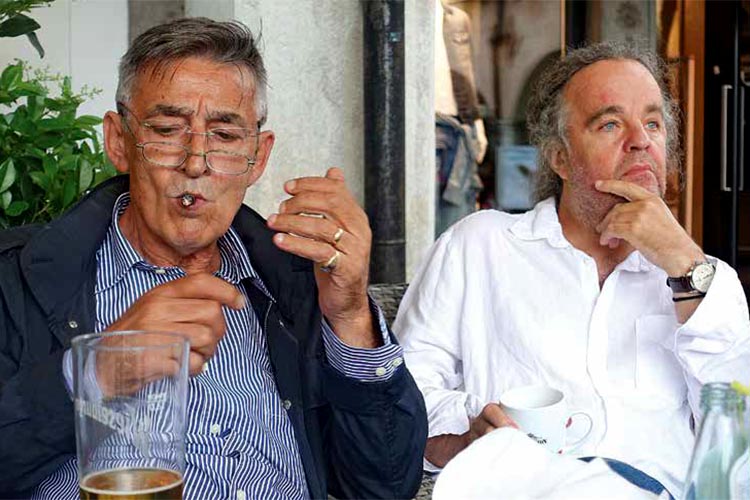
What is certain is that, in Sarajevo, he lived and grew up in a passionately traditionalist urban environment. This awakened in him a lifelong preference for those parts of cities that preserve something a little older, from a little earlier. That’s also why, in Belgrade, he and Ana have been staying with the same landlord for about fifteen years, in the same flat, in the same place on the corner of the former Đura Đakovića and Budimska streets, where it still smells like old Dorćol.
During the siege of Sarajevo, Miljenko spent a year and a half in his hometown, before abandoning it.
“That experience split my life in half, forming two separate and completely different lives. I wouldn’t say that I’ve changed, but I would have been someone completely different if it hadn’t been for that war. I would be writing something else, thinking about something else, living a completely different life. And I would live somewhere else. However, I didn’t leave of my own free will, but rather of the will of the war. And when you don’t leave of your own free will, you leave in a different way and the whole thing is experienced and lived differently. After such a departure, a person never feels the way they did before. One feels like someone who has been banished in one way or another; like someone who is a migrant, to use that modern word. In the meantime, between those two lives, those pre- and post-war lives, there is an entire decade that doesn’t belong to either, but rather marks a decade of waiting for things to be normal again.
I often wonder whether my deep-rooted intolerance of the Ustasha and domestic traitors contains something completely personal that’s much more intimate than nationalism and historical facts
“That’s because it takes a lot for a person to understand one terribly simple and selfexplanatory thing. And that is that things will never be normal again. I realised that around the year 2000 ago and developed the insight that I needed to live a different life.”
Prior to embarking on that quest for a new life, he was hit by the feeling of the impossibility of returning to Sarajevo. He hadn’t been to the city for almost five years, which was a longer period than the entire duration of the war. It is also a much longer period than when he didn’t come to Sarajevo during the ‘90s.
“There are naturally reasons why I would go to Sarajevo, but there are obviously much stronger reasons why I would not go to Sarajevo. And those reasons are of a very private and very intimate nature. A man simply doesn’t have to do certain things; he doesn’t have to participate in certain things, and he doesn’t have to attempt to turn back time by force and contrive his spaces and his cities where they no longer exist.”
Miljenko and Ana have long been living their second life. Their winter address has long been in Zagreb, while from April to October they reside in the countryside of Turopolje.
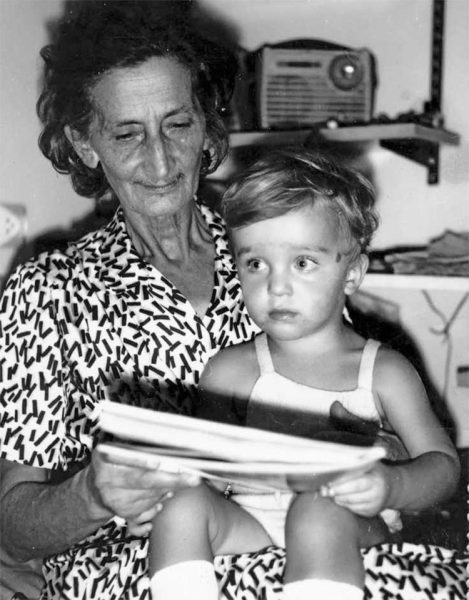
“At some point while living in our flat on the 16th floor of a Zagreb high-rise, around 15 years ago, we began fantasising about life in the countryside. I then realised that the last moment had arrived, because that could become too expensive in the next episode. Then Zagreb natives would also realise what Westerners have also been discovering: that it is better to live 20-odd kilometres from the city than in the city, and our fantasy would perish. Prices would then skyrocket and we’d have no chance. We then very ambitiously started searching for a house on the outskirts of the city until we found one. Partly with credit and partly with cash, we bought the weekend cottage of a socialist director 20 kilometres from Zagreb, from a gentleman who actually was a socialist director. We started living there and it was something sensational. That’s an excellent opportunity for a person to try to move out of their default context.”
There are few writers who write in the language of Ivo Andrić, and whose name is mentioned alongside Andrić’s as often as Miljenko’s. It is thus somehow normal to conclude this interview by asking him what Andrić means to him, apart from the fact, mentioned a the beginning of this article, that they attended the same Sarajevo secondary school.
“Ivo Andrić is our language’s most accomplished writer. And the greatest writer of our languages, whatever anyone might think of that. And the world of Ivo Andrić, his geographical world, the world of his cities, the world of his different religious-tribal and religious-national identities, actually aligns very precisely with my world. This isn’t something that’s crucial for literature, nor for the reader, but it is something that’s actually a big deal when it happens, a big deal in the most intimate sense. That gymnasium high school that Gavrilo Princip, Ivo Andrić and I attended, was solidly built, never subjected to interior renovation, and those same stairs and handrails that we all walked on have remained. We were schoolmates with a difference of over 60 years.
“Andrić is the writer of my world, and Andrić is the writer who wrote my world.”